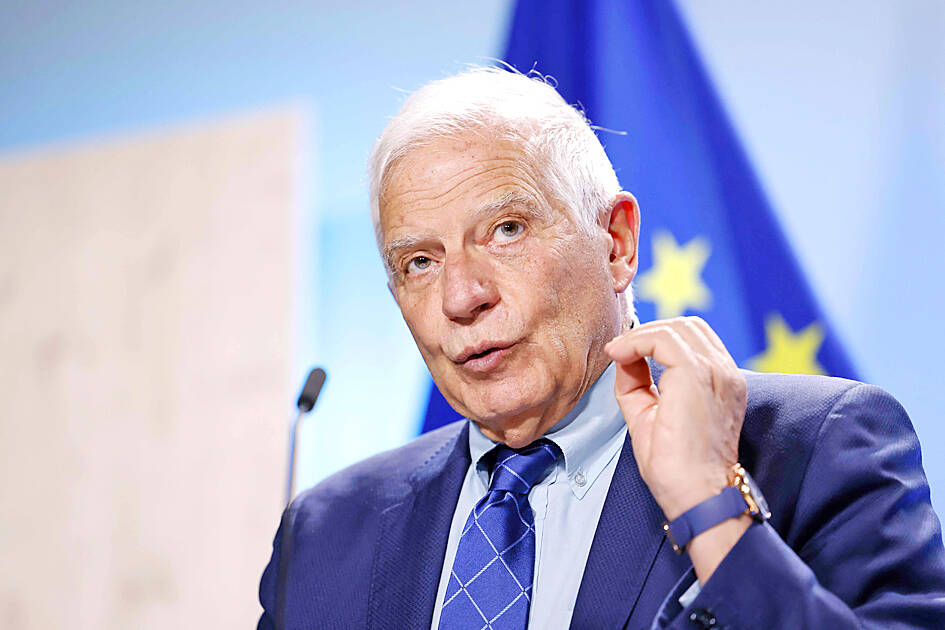The EU on Saturday offered closer political and investment ties to 20 countries from across the Indo-Pacific region, as the bloc seeks more influence despite growing Chinese and US ambitions.
At a forum that gathered foreign ministers from the EU and the Indo-Pacific, several speakers touted the Global Gateway program, Europe’s answer to China’s massive infrastructure project, the Belt and Road Initiative. The meeting on Saturday was itself a snub to Beijing, which was not invited.
“Our ambition is to work toward the preservation of the Indo-Pacific as a free, open, prosperous and inclusive region, and to build partnerships between equals,” French Minister of Europe and Foreign Affairs Catherine Colonna said in a speech.

Photo: AFP
The EU “refuses to enter a logic of blocs that would make escalation and, eventually, confrontation, inevitable,” she said.
After decades of viewing China primarily as a commercial opportunity, the EU is seeking to boost its footprint in the region and reduce its reliance on imports from the world’s second-biggest economy, including on raw materials critical for the bloc’s green transition.
The EU’s dependence on Beijing, whose leader, Chinese President Xi Jinping (習近平), has declared a “no limits” friendship with Russian President Vladimir Putin, was laid bare during the COVID-19 pandemic, when countries and companies scrambled to source masks and other equipment.
Russia’s invasion of Ukraine has heightened tensions with the West pressing Beijing to distance itself from Moscow.
The EU first adopted a common strategy on the Indo-Pacific in 2021 pushed by France, which has overseas territories in the area.
Ending Saturday’s forum, whose guests included India, Japan and Indonesia, EU High Representative for Foreign Affairs and Security Policy Josep Borrell said the bloc wants “to step up our engagement to deliver more concrete results on the ground.”
Borrell said the EU would pursue 20 Global Gateway projects in the Indo-Pacific “from investment in hydropower, solar energy plants to transportation infrastructure, railways, ports and airports.”
The EU late last year signed an agreement with Thailand to foster a bilateral dialog on energy, climate change and other issues.
While Colonna did not mention China, she said the Global Gateway strategy was meant to promote “lasting, quality infrastructure projects that don’t put countries in a situation of dependence,” including in the digital sector.
Colonna also said that French frigates would patrol more often in the region.
A French warship patrolled the Taiwan Strait last month, while China conducted military exercises in the area.
France did not invite US representatives last year, but Washington was represented on Saturday.
Paris deems the Indo-Pacific a priority. The region hosts about 1.6 million French citizens and France has a military presence in French overseas islands, including New Caledonia, Wallis-and-Futuna or Mayotte, and 8,000 soldiers.

Kehinde Sanni spends his days smoothing out dents and repainting scratched bumpers in a modest autobody shop in Lagos. He has never left Nigeria, yet he speaks glowingly of Burkina Faso military leader Ibrahim Traore. “Nigeria needs someone like Ibrahim Traore of Burkina Faso. He is doing well for his country,” Sanni said. His admiration is shaped by a steady stream of viral videos, memes and social media posts — many misleading or outright false — portraying Traore as a fearless reformer who defied Western powers and reclaimed his country’s dignity. The Burkinabe strongman swept into power following a coup in September 2022

‘FRAGMENTING’: British politics have for a long time been dominated by the Labor Party and the Tories, but polls suggest that Reform now poses a significant challenge Hard-right upstarts Reform UK snatched a parliamentary seat from British Prime Minister Keir Starmer’s Labor Party yesterday in local elections that dealt a blow to the UK’s two establishment parties. Reform, led by anti-immigrant firebrand Nigel Farage, won the by-election in Runcorn and Helsby in northwest England by just six votes, as it picked up gains in other localities, including one mayoralty. The group’s strong showing continues momentum it built up at last year’s general election and appears to confirm a trend that the UK is entering an era of multi-party politics. “For the movement, for the party it’s a very, very big

A new online voting system aimed at boosting turnout among the Philippines’ millions of overseas workers ahead of Monday’s mid-term elections has been marked by confusion and fears of disenfranchisement. Thousands of overseas Filipino workers have already cast their ballots in the race dominated by a bitter feud between President Ferdinand Marcos Jr and his impeached vice president, Sara Duterte. While official turnout figures are not yet publicly available, data from the Philippine Commission on Elections (COMELEC) showed that at least 134,000 of the 1.22 million registered overseas voters have signed up for the new online system, which opened on April 13. However,

ENTERTAINMENT: Rio officials have a history of organizing massive concerts on Copacabana Beach, with Madonna’s show drawing about 1.6 million fans last year Lady Gaga on Saturday night gave a free concert in front of 2 million fans who poured onto Copacabana Beach in Rio de Janeiro for the biggest show of her career. “Tonight, we’re making history... Thank you for making history with me,” Lady Gaga told a screaming crowd. The Mother Monster, as she is known, started the show at about 10:10pm local time with her 2011 song Bloody Mary. Cries of joy rose from the tightly packed fans who sang and danced shoulder-to-shoulder on the vast stretch of sand. Concert organizers said 2.1 million people attended the show. Lady Gaga